C Program to Find Nth Armstrong Number
In this program, we will write a C program to find the Nth Armstrong number.
Problem Statement:
We need to take an input integer n from the user, which denotes the position of the Armstrong number to be found. Then, we have to calculate the Nth Armstrong number and display it on the screen.
Solution:
An Armstrong number is a number that is equal to the sum of its own digits raised to the power of the number of digits. For example, 153 is an Armstrong number because 1^3 + 5^3 + 3^3 = 153. Similarly, 371 is also an Armstrong number because 3^3 + 7^3 + 1^3 = 371. Armstrong numbers are named after Michael F. Armstrong, who was a mathematician. These numbers are also known as narcissistic numbers, pluperfect digital invariants (PPDI), and sometimes also called plus perfect numbers.
#include <stdio.h>
#include <math.h>
int isArmstrong(int num);
int main() {
int n, i, count = 0;
// Get the value of n from the user
printf("Enter the value of n: ");
scanf("%d", &n);
// Find the Nth Armstrong number
for (i = 0; count < n; i++) {
if (isArmstrong(i)) {
count++;
}
}
printf("The %dth Armstrong number is %d", n, i - 1);
return 0;
}
// Function to check whether a number is Armstrong or not
int isArmstrong(int num) {
int originalNum, remainder, n = 0, result = 0;
originalNum = num;
// Calculate the number of digits in the number
while (originalNum != 0) {
originalNum /= 10;
++n;
}
originalNum = num;
// Calculate the sum of nth power of each digit
while (originalNum != 0) {
remainder = originalNum % 10;
result += pow(remainder, n);
originalNum /= 10;
}
// Check whether the number is Armstrong or not
if (result == num) {
return 1;
}
else {
return 0;
}
}
Output
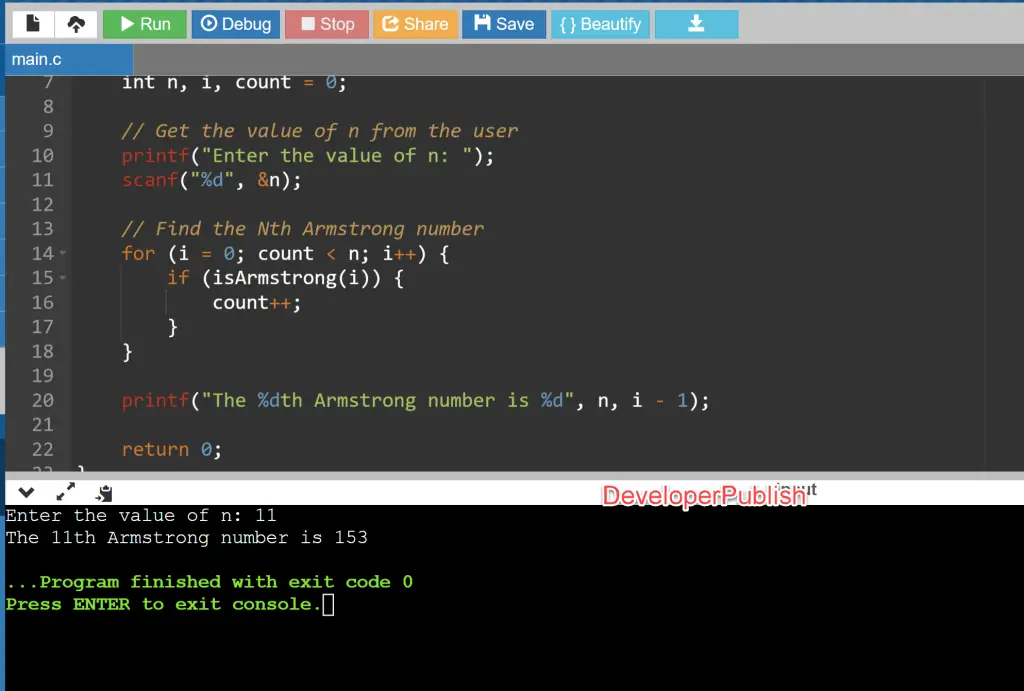
Explanation:
- We first include the standard input-output library
stdio.hand themath.hlibrary for using thepowfunction in the program using the#includepreprocessor directive. - Then, we declare the main function using the
int main()syntax. - We declare three variables
n,i, andcountas integers. - We use the
printffunction to prompt the user to enter the value ofn. - We use the
scanffunction to read the value ofnentered by the user and store it in thenvariable. - We declare a for loop that runs from 0 to infinity. Inside the loop, we call the
isArmstrongfunction to check whether the current number is an Armstrong number or not. If it is an Armstrong number, we increment thecountvariable. The loop stops whencountbecomes equal ton. - We use the
printffunction to display the Nth Armstrong number on the screen. - We declare the
isArmstrongfunction that takes an integernumas input and returns an integer as output. Inside the function, we declare four integer variablesoriginalNum,remainder,n, andresult, and initialize theresultvariable to 0. - We store the value of
numinoriginalNumvariable for future reference. - We use a while loop to calculate the number of digits in the number
numand store it in thenvariable. - We use another while loop to calculate the sum of nth power of each digit of the number
numand store it in theresultvariable. - We check whether the number
numis an Armstrong number or - not by comparing the value of
resultwith the value ofnum. If they are equal, then the function returns 1, which indicates that the number is an Armstrong number. Otherwise, the function returns 0, indicating that the number is not an Armstrong number. - Conclusion:
- In this program, we have successfully written a C program to find the Nth Armstrong number. We have used a function to check whether a number is Armstrong or not. This program can be useful in various applications where we need to find the Nth Armstrong number.

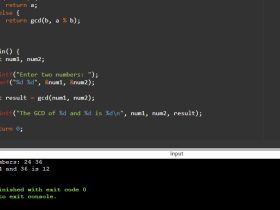
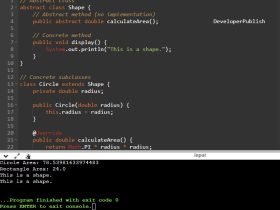
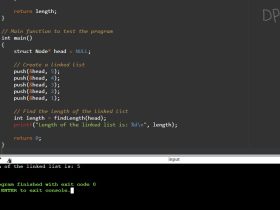
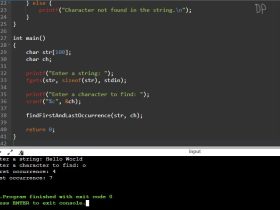
Leave a Review